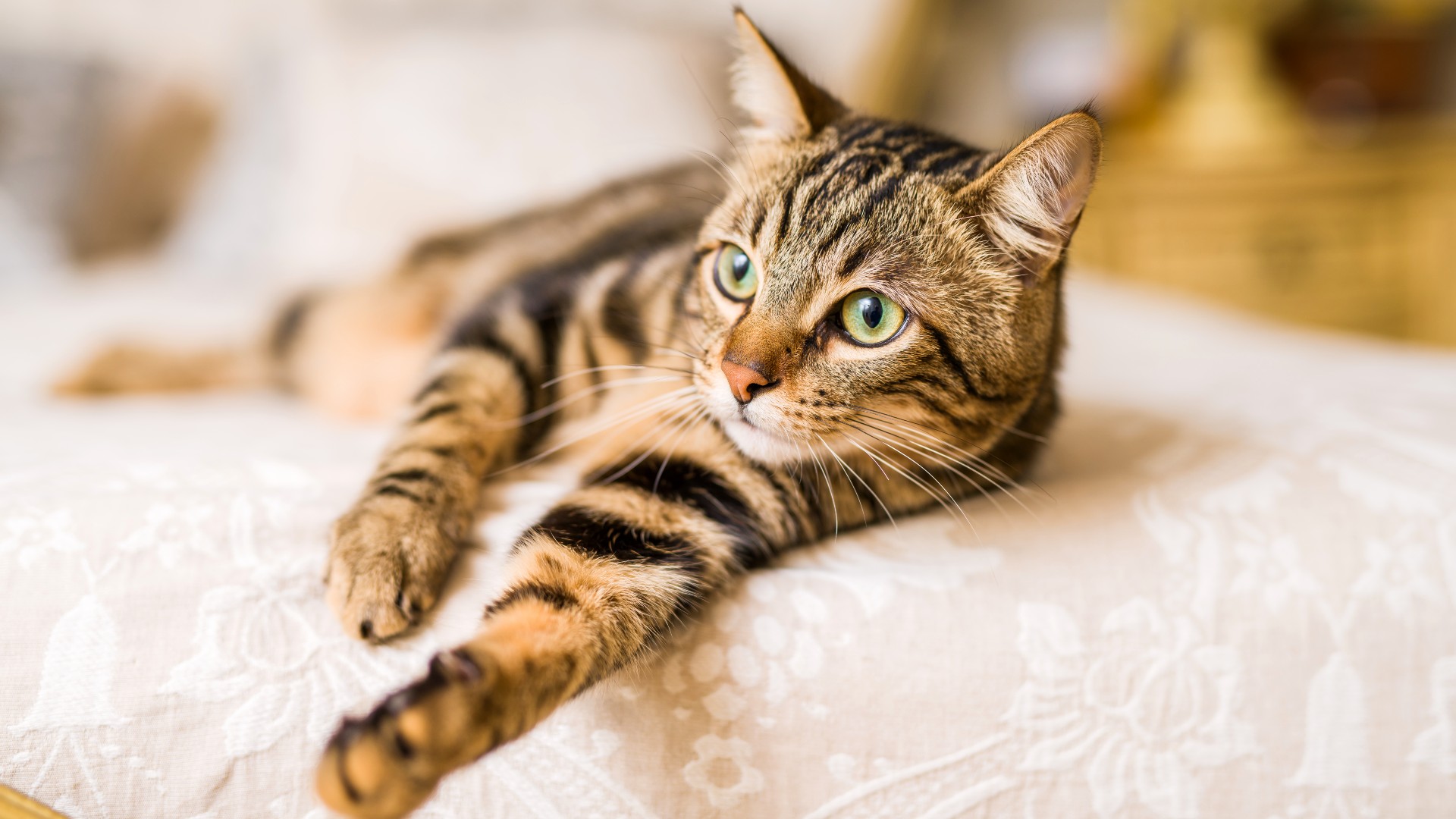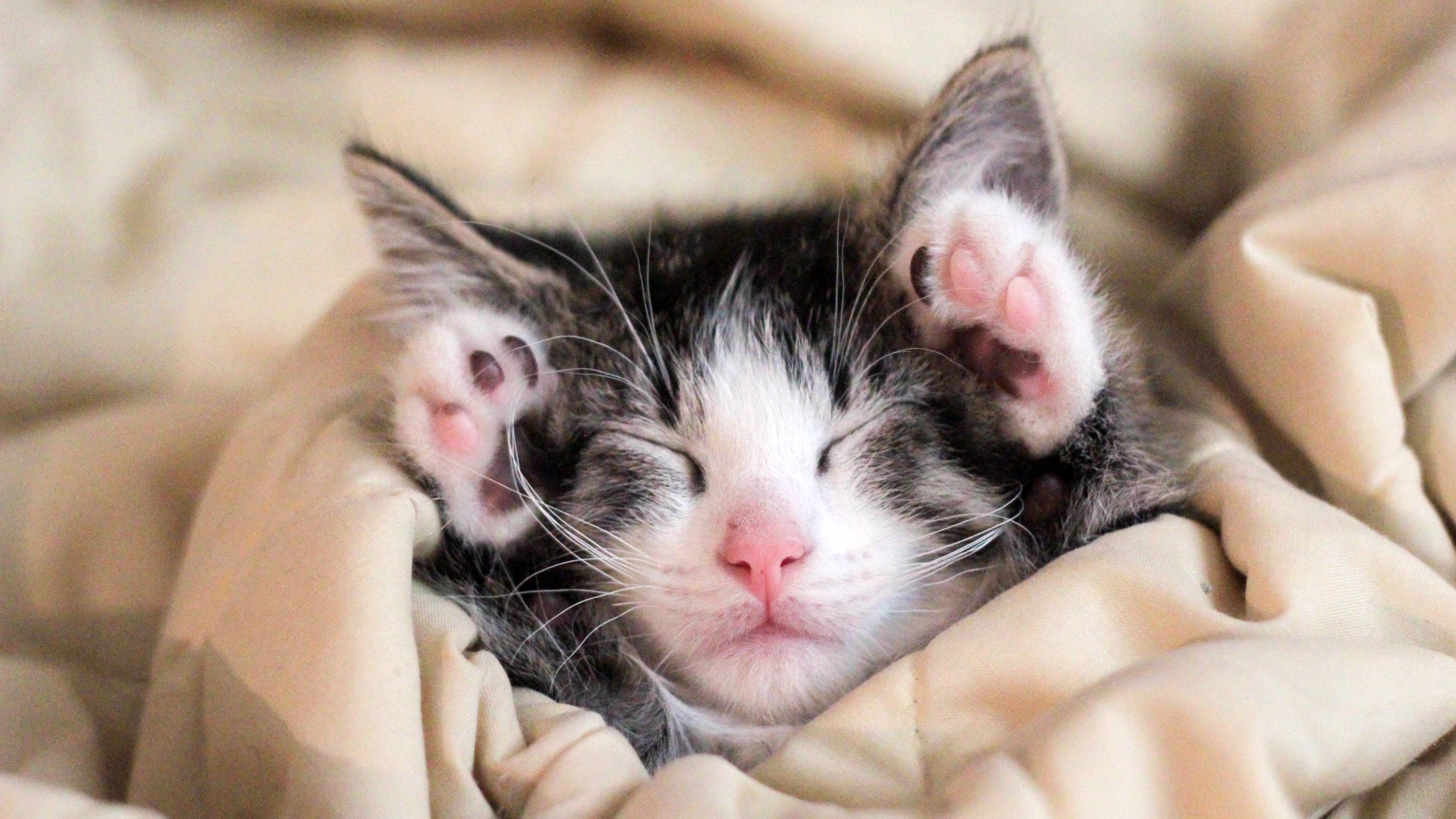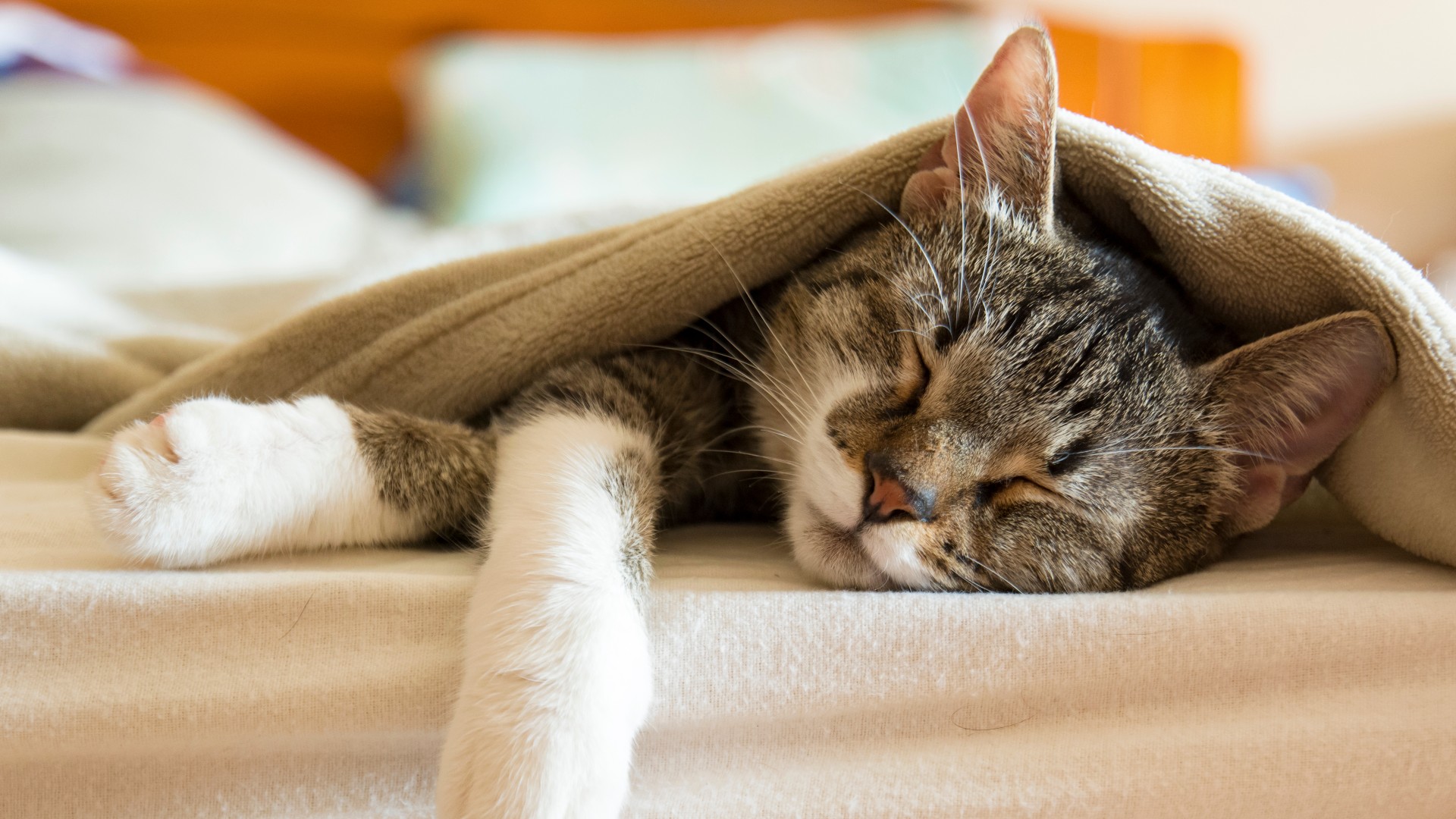Should you let a cat sleep on your bed?
Cat-nap or cat-nope? We break down the pros and cons of letting a cat sleep on your bed, plus share our top tips on how to get them to stop

Get the best advice, tips and top tech for your beloved Pets
You are now subscribed
Your newsletter sign-up was successful
The question ‘should you let a cat sleep on your bed?’ is a common one amongst feline pet parents and while there’s no right or wrong answer here, there are some things worth considering before you decide to let your kitty curl up beside you.
Even if you’ve invested in the best cat bed, sometimes your feline friend will still decide they’d much rather sleep with you. Just like us, cats are very vulnerable when they’re snoozing, so the fact that your kitty is seeking you out at night is a sign of how much they trust you.
But while snuggling with your fur baby has its perks for both of you when it comes to things like bonding and security, there are also some downsides, such as allergies and distrubed sleep quality that many pet parents report struggling with. Carefully weighing these pros and cons can help you make the right decision for you and your feline friend.
And to help you do just that, you’ll find everything you need to know below about letting your cat sleep on your bed, including why they do it, the advantages and disadvantages of being bed buddies, and some tips and tricks to get your cat to stop.
Why does your cat sleep on your bed?
Believe it or not, the reasons why your cat chooses to sleep on your bed are more complex than it simply being a super comfortable place to sleep. There are also several emotional and behavioral reasons they may decide to try to snooze beside you. Let’s take a look at some of the most common of these…
1. Love
Why do any of us choose to curl up with someone else? Why, love of course! It turns out that cats are very similar to humans when it comes to getting up close and personal with those they feel deep affection for.
While they may not try and get quite as snuggly with you as a dog would, even sleeping at the foot of the bed is one of the signs your cat loves you. And if you got your kitty during the first four to nine weeks of their life when imprinting occurs, the chances are even higher that they’ll want to stick close to you.
Get the best advice, tips and top tech for your beloved Pets
2. Comfort
Cats can sleep anywhere from a conservative 12 hours to a marathon 16 hours a day, and let’s face it, we have a feeling you find your bed pretty darn comfy, so the chances are pretty high that they will too!
We mean, seriously, what’s not to like? Cozy duvet cover? Check. Snuggly sheets? Check. Cloud-like pillows? Check. Compare that to a chair and you can quickly see why your bed is so darn enticing.
3. Warmth
If you’ve ever noticed your kitty curled up in the sun or sat on top of a pile of laundry that’s just come out the dryer, then you know how much they love warmth. And while it’s easy for them to keep themselves toasty on balmy days, the cold weather makes things more difficult.
A cat's normal body temperature is 102 degrees Fahrenheit, which is easy to maintain on warm days, but difficult to do in colder weather. During those winter months, a cat needs to use a lot more calories to keep their internal furnace firing at the right temperature - curling up next to you and absorbing some of your body heat is an easy way to help them do that.
4. Protection and security
Almost all species hold at their core the belief that there’s safety in numbers and our feline friends are no different. If you were to observe big cats in the wild, you’d quickly spot that they always sleep together as a group and there’s good reason for that - it’s much harder for predators to attack when they can’t easily isolate one cat.
While the threat of being eaten when darkness falls is very slim for domestic cats, this pack mentality remains deeply embedded in their DNA, and because lowering their guard during sleep makes them feel vulnerable, they may seek you out as a way of both protecting you and feeling protected.
5. Marking their territory
As you probably already know, cats are highly territorial and will mark furniture and items around the home as a way of signalling to other cats that this area belongs to them. This territorial behavior doesn’t just extend to other cats though.
Sometimes your feline friend will mark things as a way of letting you know that they’ve decided that a particular item is theirs and not yours. So, in your cat's mind, you could actually be sleeping in their bed rather than the other way around!
Should you let your cat sleep on your bed?

The decision as to whether or not to let your cat sleep on your bed is a personal one and will depend on various factors, such as how heavy a sleeper you are, whether you have any allergies, and what benefits there are to you and your feline friend. Here are some pros and cons to consider…
Pros
1. Bonding
If your cat’s love language is physical touch or quality time, then sleeping together could be a great way of nurturing this and helping the two of you feel closer. It can also help protect against loneliness, and give you both a sense of safety and security.
2. Stress relief
It’s been well documented that petting animals helps the human body release the feel-good hormone oxytocin, which helps lower cortisol levels in the body and relieve stress.
3. Fall asleep easier
For some people, having their cat close by can actually promote sleep quality, instilling a sense of calm that helps them to fall asleep quicker than if they were sleeping alone.
Cons
1. Allergies
If you suffer from allergies or are asthmatic, then letting your kitty sleep on your bed is probably not a good idea. Around 12 percent of Americans have allergies to cats which can result in breathing difficulties that can disturb your sleep. While choosing not to have a cat is the best solution, if that’s not possible, then keeping them outside the bedroom will make sure you get the rest you need.
2. Disturbed sleep quality
While it’s true that cat’s can sleep for up to 16 hours a day, their sleep cycles are very different to ours, so it’s not unusual for them to want to be up and about come dawn or engage in a play session at 1am - not ideal if you’re trying to get that all important beauty sleep!
And even if your cat does sleep through the night with you, it’s likely they’ll be moving about, scratching, nudging you, and possibly snoring, all things that can cause you to have a restless night in bed. While all this might not bother a heavy sleeper, if you’re prone to sleeping light, keeping your cat outside the bedroom might be the best move - especially if you often wonder, ‘Why does my cat get aggressive at night?’
3. Hygiene
Even if you treat your kitty regularly with one of the best flea treatments for cats, it’s still important to bear in mind that when you share your bed with your cat, you’re also sharing it with anything that might be hitching a ride in their coat.
And parasites aren’t the only thing to be concerned about. Unless you have a cat litter that produces no or very light tracking, you could also end up with some unpleasant germs all over your bed covers, which definitely won’t be great for your health.
How to stop your cat sleeping on your bed

If you've decided after reading the pros and cons that having your kitty sleeping on your bed definitely isn't for you, we have good news - there are plenty of great tips and tricks that can nip this behavior in the bud (or prevent it from starting in the first place). Here are a few of our favorites...
1. Cat bed
One of the first things you want to do is to make sure your feline friend has a snuggly sleep spot of their own that’s going to look and feel way more appealing than yours.
We recommend investing in one of the best luxury cat beds and furnishing it with a nice cozy blanket. Place the bed in a warm and safe corner of the house and use treats to encourage them to use it.
2. Close your bedroom door
A simple way to stop your cat from sleeping on your bed is to close the door and make sure it remains closed whether you’re in your room or elsewhere in the house. If you find your feline friend tries to scratch to get in, invest in a protector that will prevent claw marks from making a mess of your door.
3. Use a cat repellent
Cat repellent sprays are a great way to deter your kitty from using furniture you don’t want them to use. These safe and effective sprays contain scents your furkid is averse to and when sprayed lightly on the part of the bed they like to sleep on, it will put them off wanting to curl up there.
4. Train them from a young age
One of the best ways to stop your cat from sleeping on your bed is to train them from a young age that they have a designated sleep spot (their cat bed) and to be consistent with making them use it. Have it as a rule from day one that sleeping on your bed isn’t allowed and be persistent with removing them. They’ll soon get the message!
5. Give your cat access to other furniture
Investing in a cat tree can be a great way of encouraging your fur baby to sleep elsewhere. These contain a bed and toys and they also offer some of the best cat scratching posts. Plus, they’re kind of like the human version of a jungle gym, offering your kitty lots of opportunities to climb and play, who needs your bed when they have that?!
6. Try double-sided tape
Ahh, the old double-sided tape trick, it’s an oldie but a goodie. Cats hate anything sticky, so pop it on their favorite part of the bed and they’ll soon be off in search of a new sleep spot. Oh, and if you don’t have double-sided tape, aluminum foil will also work wonders.
7. Have a bedtime routine
We know, a bedtime routine sounds like something that’s just for us humans, but believe it or not, doing the same thing for your cat can help them settle for the night. Try to have an evening ritual, such as using one of the best cat brushes to groom them, before tucking them into their cat bed. They’ll come to expect this each night and will learn that these things signal that it’s time to go to sleep.
You might also be wondering, ‘Why does my cat sleep on my chest?’

Kathryn is a freelance writer who has been a member of the PetsRadar family since it launched in 2020. Highly experienced in her field, she's driven by a desire to provide pet parents with accurate, timely, and informative content that enables them to provide their fur friends with everything they need to thrive.
Kathryn works closely with vets and trainers to ensure all articles offer the most up-to-date information across a range of pet-related fields, from insights into health and behavior issues to tips on products and training.
When she’s not busy crafting the perfect sentence for her features, buying guides and news pieces, she can be found hanging out with her family (which includes one super sassy cat and a kitten), drinking copious amounts of Jasmine tea and reading all the books.
She has written for a range of publications, including Fit&Well, Top Ten Reviews, LiveScience, Goodto, and Product Hunt.
